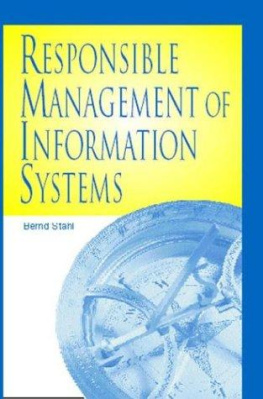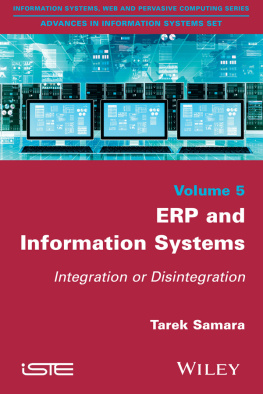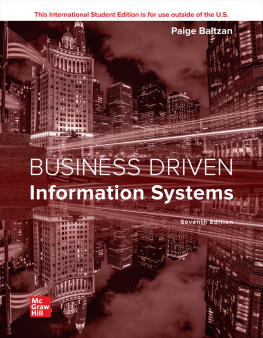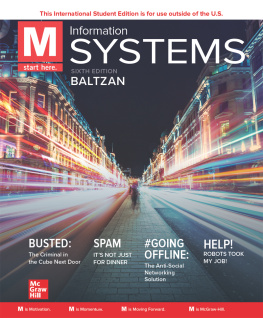Responsible Management of Information Systems
Bernd Carsten Stahl
De Montfort University, UK
Idea Group Publishing
Hershey London Melbourne Singapore
Acquisitions Editor: Mehdi Khosrow-Pour
Senior Managing Editor: Jan Travers
Managing Editor: Amanda Appicello
Development Editor: Michele Rossi
Copy Editor: Maria Boyer
Typesetter: Sara Reed
Cover Design: Lisa Tosheff
Printed at: Yurchak Printing Inc.
Published in the United States of America by
Idea Group Publishing (an imprint of Idea Group Inc.) 701 E. Chocolate Avenue
Hershey PA 17033
Tel: 717-533-8845
Fax: 717-533-8661
E-mail: cust@idea-group.com
Web site: http://www.idea-group.com
and in the United Kingdom by
Idea Group Publishing (an imprint of Idea Group Inc.) 3 Henrietta Street
Covent Garden
London WC2E 8LU
Tel: 44 20 7240 0856
Fax: 44 20 7379 3313
Web site: http://www.eurospan.co.uk
Copyright 2004 by Idea Group Inc. All rights reserved. No part of this book may be reproduced in any form or by any means, electronic or mechanical, including
photocopying, without written permission from the publisher.
Library of Congress Cataloging-in-Publication Data
Stahl, Bernd, 1968
Responsible management of information systems / Bernd Stahl.
p. cm.
Includes bibliographical references.
ISBN 1-59140-172-0 (hardcover) ISBN 1-59140-282-4 (softcover)
ISBN 1-59140-173-9 (ebook)
1. Information technologyManagement. 2. Information technologyMoral and ethical aspects. 3. Information resources managementMoral and ethical aspects. 4. Business ethics. 5. Social responsibility of business. I. Title.
HD30.2.S77 2004 658.4028dc21
2003008877
British Cataloguing in Publication Data A Cataloguing in Publication record for this book is available from the British Library.
All work contributed to this book is new, previously-unpublished material. The views expressed in this book are those of the authors, but not necessarily of the publisher.
Acknowledgements
This book started out as an attempt to clarify what it means to be responsible, to act responsibly, to have responsibility. While this is a complex endeavour in itself, it was further complicated by the concentration on the concept of responsibility in business on the one hand, and in information and communication technology on the other. As is probably the case in most academic endeavours, this one became more complicated the more research I did. Most of us seem to assume that certain people should act responsibly, that responsibility is necessary and that the world at large suffers from a lack of responsibility. But the more closely one looks at these statements, the less clear they become. An additional difficulty was that the topic of this book covers several academic disciplines or sub-disciplines and touches on a large number of academic and practical areas and topics. Furthermore, the popularity of the subject, the fact that everybody knows something about responsibility, made it hard to delimit the content of the book.
I would therefore like to thank Birger Priddat, whose research assistant I was at the time when I started work on this project, for helping me focus and for showing me some of the more interesting and worthwhile aspects of economic theory. The interaction with my colleagues at the University Witten/ Herdecke, as well as with other researchers engaged in the German discourse on business ethics, helped me appreciate the prevalent topics and also recognise their limitations. Furthermore, I would like to thank Dirk Rustemeyer for keeping me on the track of philosophical thinking and for showing me the dangers of becoming overly prescriptive.
The theory of responsibility developed in this book had taken on a somewhat-manifest form when I started to work in the Department of MIS of University College Dublin. It was there that I recognised the value of applying the theory to the area of information systems. On the one hand this allowed a concentration on manifest questions. On the other hand it required incorporating another body of literature on computer ethics, information ethics, Internet ethics, etc. However, it turned out that these writings were in fact quite well compatible with my idea of responsibility and provided a great field of application. During my time in Dublin, I was also put back into closer contact with the academic field of information systems. I would like to thank my colleagues in the MIS Department as well as my colleagues in the German Department for their support and guidance. The German Academic Exchange Service (DAAD) deserves my gratitude for facilitating the three-year stay in Dublin. My particular appreciation has to be extended to Anita Mangan, whose efforts and comments not only enriched the content of this book, but who has played a central part in rendering it understandable.
Furthermore, I want to thank my parents for their continuing moral and financial support, which allowed me to undertake the travels and adventures which led to this book. My wife Barbara, who moved with me from country to country, accepted the fact that academics do not always work the same hours as most other people, and still extended her loving encouragement, which helped me through this work. Finally, there is my son Carl Alexander, who, at this stage in life, does not yet know the difference between good and bad. I hope that when the time comes when he, too, wonders what it means to be responsible, this book will guide him part of the way.
About the Author
Bernd Carsten Stahl (Dr. rer. pol., Dipl.-Wi.-Ing., M.A., D.E.A.) studied mechanical engineering, business, economics and philosophy in Hamburg, Hagen, Bordeaux and Witten. From 1987-1997 he was an officer of the German Armed Forces. From 2000-2003 he lectured in the Department of MIS and the German Department of University College Dublin, Ireland. Since 2003 he has been working as a senior lecturer in the Faculty of Computer Sciences and Engineering and as a research associate at the Centre for Computing and Social Responsibility of De Montfort University, Leicester, UK. His area of research consists of philosophical, more specifically of normative, questions arising from the use of information and communication technology. The emphasis in this area is on the notion of responsibility. He researches the application of such normative questions in economic organisations, but also education and governmental institutions. His second area of interest consists of epistemological questions in Information Systems research.
Preface
In order to survive and prosper, almost every business in our global economy has to make use of new and evolving information technologies. This starts with the local baker who needs a telephone to be able to contact his suppliers or customers, and ends with the international virtual Internet business that exists solely in virtual reality. The use of information technology affects many aspects of our private and business life. It leads to changes in routines, new ways of understanding our environment, new distributions of power, money, and influence. The changes are sufficiently severe to warrant speaking of a new technological revolution. Like every other revolution this one will produce winners and losers, proponents and opponents. Whatever else one may think of this development, it is hard to deny that it is ethically relevant. Old forms of morality seem to lose their validity while new ways of communicating and living together emerge.
The strongest motor of these developments seems to be the economic system. Especially the impact of economic interests on the Internet is an indication of this. The Internet, introduced by the U.S. military and subsequently used mainly for scientific exchange of data has, in the last few years become a major application for all sorts of businesses. This has met the resistance of many old users of the Net, but the economic interests appear to outweigh these by far. The theoretical advantages of the Internet for businesses, the decrease of transaction costs, the incredible market reach, the unknown possibilities of communicating and interacting with all sorts of business partners have propelled the Internet and its related technologies to the top space in the interest of businesses. A sign of the economys enthusiasm for the Internet was the dot.com bubble. Even after the bubble burst, however, the economic promises of new information technologies seem stunning.









